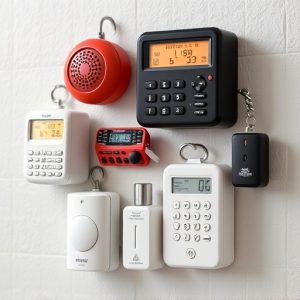Wearable Alarms: Rechargeable vs Battery-Powered Safety Solutions
Choosing between rechargeable and battery-powered personal alarms depends on balancing eco-sustainab…….
Choosing between rechargeable and battery-powered personal alarms depends on balancing eco-sustainability, cost, and immediate protection needs. Rechargeables offer longer lifespans, reduce waste with USB charging, but require regular topping up. Battery-powered models provide instant activation with no charging, but necessitate frequent replacements. For outdoor activities or solo journeys where immediate assistance is key, batteries win; for long-term use and sustainability, rechargeables are preferable. Both types ensure swift attention-grabbing sirens, with important additional features like water resistance, decibel level, lightweight design, and smart safety functionalities to consider.
In today’s fast-paced world, ensuring personal safety is paramount. Wearable alarms with loud sirens offer a convenient and effective solution, especially during outdoor activities or in emergency situations. This article delves into the world of wearable alarms, exploring their key features and benefits. We conduct a thorough comparison between rechargeable and battery-powered models, guiding you through the factors that matter most when choosing the right alarm for optimal safety. Understanding these options is crucial for making an informed decision.
- Understanding Wearable Alarms: Features and Benefits
- Rechargeable vs Battery-Powered Personal Alarms: A Comparative Analysis
- Choosing the Right Wearable Alarm: Factors to Consider for Optimal Safety
Understanding Wearable Alarms: Features and Benefits
Wearable alarms with loud sirens are a modern twist on personal safety, offering users an additional layer of protection in various situations. These devices are designed to be compact and lightweight, allowing them to be worn as accessories, ensuring convenience and ease of use. One of the key features that set wearable alarms apart is their versatility; they can be powered by either rechargeable batteries or traditional disposable ones, catering to different user preferences and needs.
In terms of benefits, rechargeable vs battery personal alarms provide users with the advantage of sustainability and cost-effectiveness. Rechargeable options reduce electronic waste, while disposable batteries offer instant readiness and convenience. With a simple press of a button, these alarms can emit powerful sirens, attracting attention and potentially deterring potential threats. This technology is especially beneficial for individuals who are often outdoors, alone, or in areas with limited access to immediate help.
Rechargeable vs Battery-Powered Personal Alarms: A Comparative Analysis
When it comes to wearable alarms with loud sirens, the choice between rechargeable and battery-powered options is a common dilemma for consumers. Rechargeable models offer environmental and economic benefits as they eliminate the need for frequent battery replacements. These devices are typically powered by built-in rechargeable batteries that can last for several months or even years with proper care, reducing electronic waste. Moreover, recharging these alarms often involves simple USB connectivity, making them convenient to top up at any time.
On the other hand, battery-powered personal alarms provide immediate and reliable protection since they don’t rely on charging cycles. Batteries offer instant power, ensuring the alarm sounds promptly when needed. While this convenience comes with regular battery replacements, it’s a small trade-off for those who prioritize quick deployment. In terms of longevity, rechargeable alarms often outlast their battery-powered counterparts, making them a sustainable choice for long-term use in emergency situations or as daily personal safety devices.
Choosing the Right Wearable Alarm: Factors to Consider for Optimal Safety
When selecting a wearable alarm with loud sirens, several factors come into play to ensure optimal safety. One key distinction lies in power sources: rechargeable versus battery-powered personal alarms. Rechargeable options are environmentally friendly and cost-effective in the long run, as they can be topped up when needed. However, battery-powered alarms offer instant readiness and peace of mind, with no worry about charging or drainage.
Other considerations include water resistance, a crucial feature for outdoor activities or emergency situations involving water. Loudness is also essential; ensure the alarm meets your desired decibel level for maximum impact. Additionally, lightweight design and comfort are vital for all-day wear, while smart features like customizable alerts and automatic fall detection can enhance safety further.
Wearable alarms with loud sirens are a powerful tool for personal safety, offering both convenience and peace of mind. When choosing between rechargeable and battery-powered options, consider your lifestyle, accessibility to charging, and duration needed. Understanding the unique features and benefits of each type allows you to make an informed decision, ensuring optimal safety without compromising on portability. In the ongoing debate of Rechargeable Vs Battery Personal Alarms, both have their merits, making it crucial to select one that aligns with your needs and daily routines.


